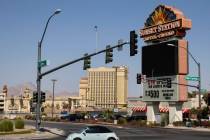Using a Las Vegas Strip hotel minibar can cost up to $75 — VIDEO
Storing that leftover pizza inside a hotel minibar fridge can cost you as much as $75 on the Las Vegas Strip.
The fee is meant to deter guests from gaming the minibars in their rooms, hotel operators and analysts said.
Some guests remove minibar items to keep their personal food or drinks — bought at nearby convenience stores for half the price — fresh and cool.
“I probably wouldn’t even bring food back because as soon as you open that door, you are screwed,” said California resident Ray Gertsch, who was staying at Caesars Palace Wednesday. “It only took me one time to learn my lesson.”
Minibar fees received renewed attention last month on social media when Twitter user @LasVegasLocally posted a photo of a Caesars Palace sign about the $75 fee.
$75 charge if you put a bottle of water in a @CaesarsPalace minibar. 🤔 (h/t @wtcgroup) pic.twitter.com/CnOLxKp9wa
— Las Vegas Locally 🌴 (@LasVegasLocally) March 20, 2019
“Wow, that’s excessive,” Twitter user @DarthShadow2 responded.
Another user was sympathetic.
“Idiots remove the stuff from the minibar to put all their personal crap in, later claim thinking it was a personal fridge. It’s about time!” wrote user @D_motta77.
Caesars Entertainment Corp operates nine properties in Las Vegas, but has minibars in just two high-end properties, Caesars Palace and Cromwell.
Most minibars in use on the Strip are installed with sensors that automatically charge a guest when an item is removed for longer than 45 seconds, enough time for a person to read the label and decide whether to consume it. The charge remains even if the item is placed back in the minibar.
Caesars has been charging a fee for personal use since 2005, the company said.
“This fee was instituted because guests were emptying their minibars to place personal items inside — resulting in waste and additional labor costs to restock them. In order to make sure we are upfront with our guests, and to make our employees’ jobs less tedious, we have placed the notice as a reminder that minibars are not to be used for personal reasons,” said Caesars Entertainment spokeswoman Jennifer Forkish.
MGM Resorts International’s high-end properties such as Aria, Bellagio and Mandalay Bay charge $50 for storing personal goods in the minibar.
“They should just have another mini-fridge for personal use or not put so much stuff in the minbar,” said Tracy Giaccetti, who was visiting Las Vegas Wednesday for a conference and staying at Caesars. Giaccetti said she avoids the minibar because of its high prices.
Suites in many Strip properties offer refrigerators for personal use alongside minibars. The Cosmopolitan offers refrigerators as well as minibars in all of its rooms. Palazzo and The Venetian offer guests a shelf in their minibars to store personal items, but warn they are not necessarily cool enough for medication or baby formula, said spokesman Keith Salwoski.
UNLV hospitality professor Mehmet Erdem said charging for personal use of the minibar is a common practice to deter its misuse. He said the fee charged by Caesars and Cromwell is fair.
“The $75 fee for misusing the minibar is probably reasonable when one considers the additional labor such situations could create for guest room attendants as well as other staff, such as delays in cleaning-up the room, re-stocking items in the minibar — especially when it is hard to tell if they have been tampered with,” Erdem said.
Michael McCall at Michigan State University disagreed, saying high fees aren’t worth the harm it can do to customer loyalty.
“This is a really bad idea that will only incense customers. They are likely to be quite vocal and the front desk will spend more time reversing these charges. Personally, I would eliminate the minibar,” McCall said.
Guests needing to store personal items can rent refrigerators from upscale Strip properties such as Wynn Las Vegas and Aria for between $25 and $40 and from mass-market hotels such as Flamingo and Luxor for between $15 and $25. For comparison, a new Insignia mini refrigerator can be purchased just off the Strip at Best Buy for $90.
More than half of Strip hotels offer refrigerators free to guests who need one to keep medicine cool. Gertsch said he used a free one from Caesars to store insulin.
Mass-market hotels don’t offer minibars in their standard rooms because their cost-conscious guests are unlikely to pay $12 for water and soda they can buy on the street for $3, said Bruno Agrario, vice president of sales and marketing at Bartech, whose minibars are in use in about 40,000 rooms in Las Vegas.
Bartech offers trays for mass-market hotels that are cheaper to operate, enabling them to offer water and other items at more affordable prices, Agrario said.
Sensor-based
Before sensors were installed, the cost of operating minibars was greater than the revenue generated because of the large workforce needed to maintain them as well as misuse and theft, Agrario said. Staff would have to carry all minbar items on a cart and stop at each room to check daily use.
A worker can, on average, service about 100 minibars a day, Agrario said.
That would imply that most Strip properties with 3,000 to 4,000 rooms would need 30 to 40 employees if they had to check all their minibars daily . With a minimum union salary of $25 an hour, including benefits, that would cost a Strip resort as much as $2 million a year in labor.
The sensors notify the hotel what items have been moved or removed, enabling staff to visit just those rooms with just the particular items touched.
Only about a third of Las Vegas rooms have daily minibar use, according to Agrario, meaning Strip properties with automatic minibars — and fee policies that deter misuse — need just 10 to 13 employees on average to maintain them, saving properties as much as $1.3 million a year.
The Review-Journal is owned by the family of Las Vegas Sands Corp. Chairman and CEO Sheldon Adelson. Las Vegas Sands operates The Venetian and Palazzo.
Contact Todd Prince at 702-383-0386 or tprince@reviewjournal.com. Follow @toddprincetv on Twitter.



























